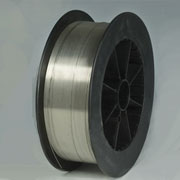Class: ER309LSI
AWS: A5.9
Conforms to Certification: AWS A5.9 ASME SFA A5.9
Weld Process Used for Mig (GMAW) & Submerged Arc (SAW)
AWS Chemical Composition Requirements
C = 0.03 max
Cr = 23.0 – 25.0
Ni = 12.0 – 14.0
Mo = 0.75 max
Mn = 1.0 – 2.5
Si = 0.65 – 1.00
P = 0.03 max
S = 0.03 max
Cu = 0.75 max
Available Sizes – Diameter X Spool Sizes
.025 x 2#, 10#, 25#
.030 x 2#, 10#, 25#, 30#, 33#
.035 x 2#, 10#, 25#, 30#, 33#
.045 x 2#, 10#, 25#, 30#, 33#
1/16 x 10#, 25#, 30#, 33#
Application
ER309LSI is suitable for joining stainless steels of the 304 type and 347 types. The higher silicon gives arc stability and exceptionally smooth bead appearance.
| Deposited Chemical Composition % (Typical) | ||
| C = 0.019 | Mo = 0.15 | P = 0.008 |
| Cr = 23.50 | Mn = 1.85 | S = 0.006 |
| Ni = 12.95 | Si = 0.84 | |
| Mechanical Properties (R.T.) | |
| Yield Strength | 60,500 psi |
| Tensile Strength | 89,000 psi |
| Elongation | 35% |
| Reduction of Area | 60% |
Deposited All Weld Metal Properties
Data is typical for ER309LSI weld metal deposited by Mig using Argon + 2% oxygen as the shielding gas. Data on sub-arc is not presented, as sub-arc is dependent on the type of flux used.
| Recommended Welding Parameters | ||||||
| GMAW “Mig Process” | Reversed Polarity | |||||
| Wire Diameter | Wire Feed | Amps | Volts | Shielding Gas | Gas CFH | |
| Short Arc Welding | .030 | 13-26 | 40-120 | 16-20 | Argon+2% O2 | 25 |
| .035 | 13-26 | 60-140 | 16-22 | Argon+2% O2 | 25 | |
| Spray Arc Welding | .035 | 20-39 | 140-220 | 24-29 | Argon+2% O2 | 38 |
| .045 | 16-30 | 160-260 | 25-30 | Argon+2% O2 | 38 | |
| 1/16 | 10-16 | 230-350 | 27-31 | Argon+2% O2 | 38 | |
Other shielding Gases may be used for Mig welding. Shielding gases are chosen taking Quality, Cost, and Operability into consideration
| Recommended Welding Parameters | ||
| SAW “Submerged Arc Welding Process” | Reversed Polarity Suggested | |
| Wire Diameter | Amps | Volts |
| 3/32 | 250-450 | 28-32 |
| 1/8 | 300-500 | 29-34 |
| 5/32 | 400-600 | 30-35 |
| 3/16 | 500-700 | 30-35 |
Both Agglomerated and fused fluxes can be used for submerged arc welding.
Note: The chemical composition of the flux mainly affects the chemistry of the weld metal and consequently its corrosion resistance and Mechanical properties.



